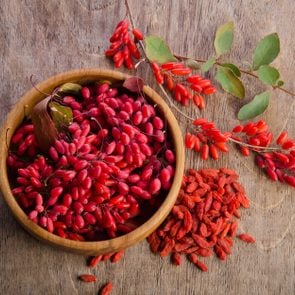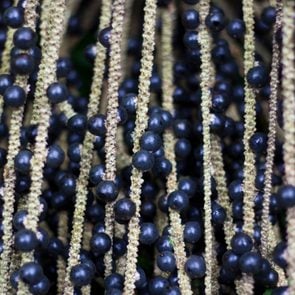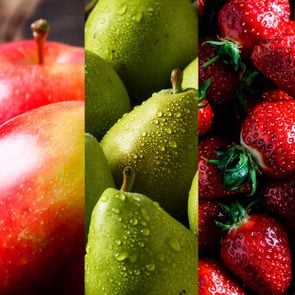Should You Eat Goji Berries? What to Know About Their Benefits and Nutrition
Updated: May 12, 2021
The sweet-but-tart goji berry is known as a superfruit. Here's what you need to know about its potential health benefits.
What are goji berries?
For more than 2,000 years, sweet-but-tart goji berries have been a part of traditional Chinese medicine. They are believed to have many benefits for health and well-being and are used in traditional cooking. They taste something like a tart, dried cranberry or sour cherry.
Goji berries are traditionally used in Chinese soups and teas, according to research in a 2019 issue of Oxidative Medicine and Cellular Longevity. Goji (also called Lycium fruit or Lycium barbarum), is found in the northwest region of China and in the Mediterranean. Each small berry is 1-2 centimeters long and bright orange, though there are black goji berries too.
You can find goji as a dried fruit, powdered, and in juices, says nutritional psychiatrist Umadevi Naidoo, MD, director of nutritional and lifestyle psychiatry at Massachusetts General Hospital and author of This is Your Brain on Food.
Like tomatoes and gooseberries, goji berries are in the nightshade family, says Emmaline Rasmussen, RDN, a registered dietitian nutritionist in Chicago. “They share the same characteristic of having tiny seeds.”
Goji berry nutrition facts
A one-ounce serving (five tablespoons) of dried goji berries has the following:
Calories: 98
Protein: 4 grams (g)
Fat: 0 g
Carbohydrate: 22 g
Fiber: 3.6 g
Iron: 1.9 milligrams (mg) (11 percent of the daily value (DV))
Vitamin C: 13.6 mg (15 percent of the DV)
What are the benefits of goji berries?
Yes, goji berries have health benefits. In fact, there are probably benefits of goji berries you don’t know about.
“Goji berries are especially high in vitamin C,” says Rasmussen. Vitamin C, an antioxidant, is used by the body to make collagen (the structure that keeps skin smooth and line-free). It also supports the immune system and aids in iron absorption, notes the National Institutes of Health.
Goji berries are also packed with carotenoids, which are plant-based compounds that convert into vitamin A in the body. “Vitamin A supports the health of your skin and eyes,” Rasmussen says. These are also packed full of antioxidants, and can be part of a healthy anti-inflammatory diet.

How goji berries may improve your health
While there are many health claims for goji berries, there’s not enough evidence that the fruit can treat diabetes, cancer, high blood pressure, weight loss, or that they can help with better energy, sleep, or mood. That doesn’t mean they can’t support the health of your body in different ways. Here’s why they’re worth including in your diet.
Goji berries are packed with anti-aging antioxidants
“Goji is rich in antioxidants, compounds that help neutralize free radicals, which are harmful molecules that can cause cell damage,” Dr. Naidoo says. While red goji berries tend to be more readily available, you can find black goji in specialty stores and online. Black goji has more antioxidants compared to red, though red had more carotenoids, according to a study published in Chemistry Central Journal in 2017. (More on that below.)
Goji berries may help preserve your vision
Along with carrots, add goji berries to your sharp-sight diet.
“Goji berries contain zeaxanthin, which is a bioactive known as a carotenoid and is found in high concentration in [these fruits],” Dr. Naidoo says. Zeaxanthin is an antioxidant that research shows protects the retina against light-induced damage. “Consuming zeaxanthin can help protect eyes against a blinding condition called age-related macular degeneration,” she explains.
Goji berries may help lower blood sugar
In a small trial, people with diabetes who took a supplement made from a specific goji berry carbohydrate twice daily for three months had lower blood sugar levels compared to a control group, according to a study in Medicinal Chemistry in 2015. Still, more research is needed to test its efficacy, as well as if the fruit alone would be potent enough to help lower blood sugar.
However, this also means that people who take medications to lower their blood sugar may need to be cautious when also consuming goji. Always consult your doctor first.
Goji berries may have anti-cancer properties
Goji is sometimes used in traditional Chinese medicine for cancer protection, and cell research shows promising activity against cancer. While goji alone cannot prevent or treat cancer, there is some preliminary data showing that specific compounds within may help reduce the spread of certain breast cancer cells, according to a study in Folia Medica in 2019.
Are goji berries safe?
In general, goji berries are considered “possibly safe” during the short term, according to the U.S. National Library of Medicine. Don’t consume goji if you are pregnant or breastfeeding, are allergic to tobacco, peaches, tomatoes, and nuts, or have low blood pressure.
There are some potential medication interactions to consider. Talk to your doctor if you’re on the following drugs:
- Diabetes drugs
- Blood pressure medicine
- Warfarin (Coumadin) to slow blood clotting
- Medicines changed by the liver. Goji may slow down the breakdown of CYP2C9 substrates, increasing their potency and the risk of side effects. Common ones include NSAIDs (ibuprofen and celecoxib), amitriptyline (Elavil) for depression, diazepam (Valium) for anxiety, and the breast cancer treatment drug tamoxifen.
How to eat goji berries
You can find dried goji berries in the bulk section of your grocer, as well as online at outlets like Nuts.com. Goji powder is more prone to oxidation and can go rancid quickly, whereas dried goji berries can last a bit longer in your pantry, says Rasmussen.
Still, she cautions, the dried berry is prone to molding. “I recommend inspecting them well before eating, storing in an airtight container, and not buying more than you can comfortably eat within one or two months,” Rasmussen says.
Here are ways you can incorporate the fruit into your meals and snacks:
- Tossed in a homemade trail mix (Try this sweet ‘n’ spicy trail mix.)
- Added to granola
- Blended into a smoothie
- Mixed in oatmeal
- Included in a homemade dressing: Blend balsamic vinegar, extra virgin olive oil, goji, and a teaspoon of chia, and add water to reach your desired consistency, suggests Rasmussen.
- As a topping for chia pudding or yogurt, Dr. Naidoo recommends.
- In goji berry tea























